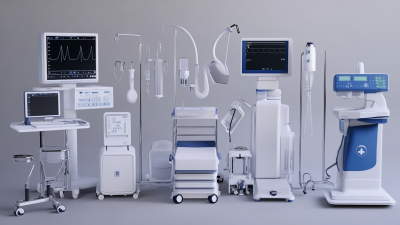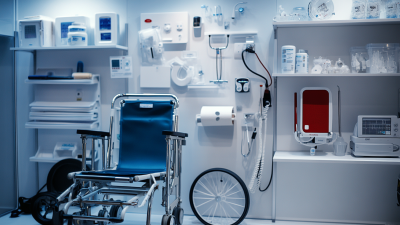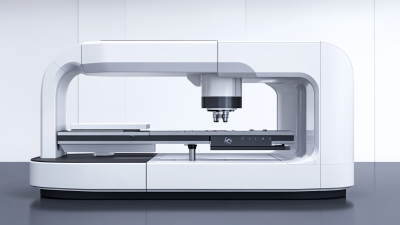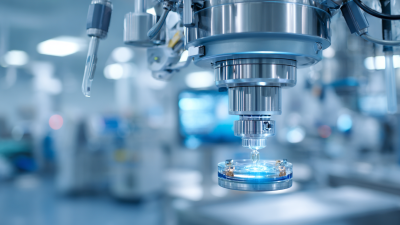Unlocking Enhanced Patient Care with Advanced Hospital Equipment Benefits
In the rapidly evolving landscape of healthcare, the integration of
advanced hospital equipment has become essential for enhancing
patient care and improving clinical outcomes. According to a report by
MarketsandMarkets, the global
hospital equipment market is projected to reach $1,700 billion by 2025, indicating a
considerable investment in innovative technologies that streamline operations and
elevate the standards of patient services. These advancements not only facilitate
accurate diagnostics and efficient treatment procedures but also enable healthcare
providers to deliver more personalized care.
 Furthermore, the implementation of digital solutions, such as telemedicine platforms and
automated monitoring systems, has been shown to reduce hospital readmission rates by
up to 30%, reinforcing the crucial role of
modern hospital equipment in fostering a more effective healthcare environment. As
we delve deeper into this topic, it becomes clear that understanding the benefits of
these innovations is vital for all stakeholders in the healthcare sector.
Furthermore, the implementation of digital solutions, such as telemedicine platforms and
automated monitoring systems, has been shown to reduce hospital readmission rates by
up to 30%, reinforcing the crucial role of
modern hospital equipment in fostering a more effective healthcare environment. As
we delve deeper into this topic, it becomes clear that understanding the benefits of
these innovations is vital for all stakeholders in the healthcare sector.
Evolving Healthcare: The Role of Advanced Equipment in Patient Outcomes
The integration of advanced hospital equipment is pivotal in enhancing patient outcomes, as supported by numerous studies. According to a report by the Healthcare Information and Management Systems Society (HIMSS), hospitals that adopted state-of-the-art technologies, such as EHR systems and telemedicine tools, documented a 20% improvement in patient satisfaction and a 15% reduction in hospital readmission rates. This correlation underscores the significance of leveraging technology not merely as a trend but as a foundation for quality patient care.
Moreover, a recent study published in the Journal of Healthcare Engineering highlights that the use of advanced diagnostics and imaging equipment minimizes diagnostic errors by up to 40%. By implementing tools like AI-assisted imaging and robotic surgery, healthcare providers are not only optimizing operational efficiency but also facilitating more accurate and timely clinical decisions. This evolution in medical technology emphasizes a shift towards a patient-centric model, ultimately leading to better outcomes and a more robust healthcare system.
Unlocking Enhanced Patient Care with Advanced Hospital Equipment Benefits
Innovative Technologies: Transforming the Landscape of Hospital Care
Innovative technologies are fundamentally transforming the landscape of hospital care, paving the way for enhanced patient outcomes and experience. With the rise of digital health technologies (DHTs) and artificial intelligence (AI), healthcare systems worldwide are beginning to bridge critical gaps in service accessibility and quality. For instance, the World Economic Forum highlights that over 4.5 billion people lack access to essential healthcare services. This alarming statistic underscores the urgency for healthcare innovation, particularly in regions like sub-Saharan Africa where novel AI tools are being deployed to address cardiovascular health effectively.

Moreover, advancements such as AI-powered genomics are ushering in a new era of personalized medicine, allowing for tailored treatment plans that cater to individual patient needs. The integration of AI in healthcare not only improves diagnostic accuracy but also enhances the ability to predict health outcomes, thereby fostering a more proactive approach to patient care. In India, the health tech boom is evident as startups emerge to revolutionize the sector, focusing on enhancing accessibility, affordability, and the overall quality of care. This dynamic interplay between technology and healthcare signifies a substantial shift towards a more efficient and patient-centric approach in hospital environments.
Cost-Effectiveness of Modern Medical Equipment: Savings for Patients and Institutions
The cost-effectiveness of modern medical equipment plays a crucial role in enhancing patient care while simultaneously reducing financial burdens on healthcare institutions. According to a report by the World Health Organization, hospitals can save up to 30% in operational costs through the adoption of advanced medical technologies. This is not only beneficial for institutions but also translates into significant savings for patients, as reduced costs often lead to lower fees for treatments and procedures.
Investments in state-of-the-art equipment can result in improved diagnostic accuracy and treatment efficacy, which contribute to better patient outcomes. A study published in the Journal of Health Economics found that hospitals that incorporated advanced imaging technologies, such as MRI and CT scans, saw a 20% increase in diagnostic precision. These improvements not only minimize unnecessary procedures but also decrease the length of hospital stays, further lowering costs. As healthcare continues to evolve, the integration of cost-effective modern medical equipment will be pivotal in delivering enhanced patient care while managing the fiscal responsibilities of healthcare systems.
Enhancing Diagnostics: How Advanced Tools Improve Disease Detection
 Advanced hospital equipment plays a crucial role in enhancing diagnostics, leading to improved disease detection and better patient outcomes. With the integration of cutting-edge technologies such as artificial intelligence and advanced imaging systems, healthcare professionals can now identify conditions at much earlier stages than ever before. These tools provide high-resolution images and analytical data that allow for a more precise understanding of a patient’s health status, significantly reducing the chances of late-stage diagnosis.
Advanced hospital equipment plays a crucial role in enhancing diagnostics, leading to improved disease detection and better patient outcomes. With the integration of cutting-edge technologies such as artificial intelligence and advanced imaging systems, healthcare professionals can now identify conditions at much earlier stages than ever before. These tools provide high-resolution images and analytical data that allow for a more precise understanding of a patient’s health status, significantly reducing the chances of late-stage diagnosis.
Moreover, the benefits of these advanced tools extend beyond mere detection. They enable a more comprehensive analysis of diseases, allowing for tailored treatment plans that align with individual patient needs. For instance, advanced blood analysis machines can quickly process complex biochemical tests, delivering results in a fraction of the time it used to take. This rapid turnaround facilitates timely interventions, making a substantial difference in recovery rates and overall patient care. As hospitals continue to embrace these innovations, the future of diagnostics looks promising, ensuring that patients receive the highest standard of medical attention.
Streamlining Workflow: The Impact of Equipment on Hospital Efficiency
In the ever-evolving landscape of healthcare, advanced hospital equipment plays a pivotal role in streamlining workflows and enhancing overall efficiency. Modern technologies such as automated systems, telehealth solutions, and state-of-the-art imaging devices not only improve patient outcomes but also reduce the administrative burden on staff. By integrating such equipment, hospitals can minimize delays in diagnosis and treatment, allowing healthcare professionals to focus on delivering exceptional care.
To maximize the benefits of advanced hospital equipment, consider implementing a robust training program for staff. Proper training ensures that all team members are proficient in utilizing the technology, which can significantly reduce errors and speed up processes. Additionally, regular maintenance of equipment is crucial; well-maintained tools translate to reliable performance, minimizing downtime and disruptions in service.
Another effective strategy is to analyze workflow patterns and identify bottlenecks. By using data analytics software, hospitals can monitor usage rates and pinpoint areas for improvement. Adjusting the layout of equipment can also optimize the flow of work, making it easier for healthcare providers to access the tools they need quickly and efficiently. Implementing these tips can lead to a more streamlined operation, ultimately enhancing patient care and satisfaction.
Unlocking Enhanced Patient Care with Advanced Hospital Equipment Benefits - Streamlining Workflow: The Impact of Equipment on Hospital Efficiency
| Equipment Type | Benefit to Patient Care | Impact on Workflow Efficiency | Reduction in Processing Time (%) |
|---|---|---|---|
| MRI Scanner | Improved diagnostic accuracy | Increased throughput of patients | 30% |
| Telehealth System | Enhanced access to care | Reduced patient wait times | 40% |
| Electronic Health Records (EHR) | Streamlined patient information | Improved inter-departmental communication | 25% |
| Automated Medication Dispensing | Increased medication safety | Decreased pharmacy workload | 20% |
| Patient Monitoring System | Continuous patient oversight | Faster response to emergencies | 35% |
Related Posts
-

Ultimate Guide to Choosing the Best Medical Monitoring Devices for Your Needs
-

Exploring Unique Options for Sourcing Medical Equipment Globally
-

How to Choose the Best Home Medical Equipment for Your Needs
-

Trustworthy Quality Global Sharing of Best Home Health Supplies Made in China
-

Advantages of Medical Device Testing for Global Buyers
-

Innovative Industry Applications of the Best Medical Equipment: Transforming Healthcare Globally
